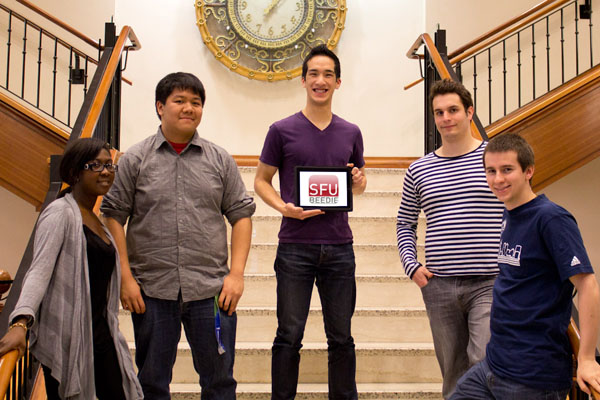Bridging the Digital Divide
Jun 21, 2012
Beedie App Brings Software Engineers, Business Professionals – and the World – Closer Together.
In 2010’s hit film The Social Network, a young Mark Zuckerberg knows he has just launched something special when – out of the blue – a fellow Harvard student asks him to “Facebook me.”
Simon Fraser University’s Justin Lee, a fourth-year accounting student in the Beedie School of Business who helped develop the pioneering new Beedie iPhone app, hasn’t quite experienced his Zuckerberg moment – at least not yet. “People have messaged me and said, ‘Good job,’” Lee says, “but it’s not like you walk around campus and everybody’s using it.”
Lee’s modesty belies the weight of his team’s achievement. Originally conceived in an innovative course combination that involved students from Bus 338, an undergraduate class on business innovation, and CMPT 275, an undergraduate course on Software Engineering, the SFU Beedie mobile app was eventually developed by students who laboured for the better part of a year on the project, developing, refining and beta-testing features. The result: a one-stop communication portal for the Beedie community, merging Facebook, Twitter and other social media with school news, customized transit information, campus maps and a unique Q&A forum for students. “The app integrates it all into one medium,” Lee explains. “It’s got all the services students need.”
Behind the app itself, however, is an equally compelling story of interdisciplinary cooperation at SFU, with business and computing science students collaborating directly on the project. “You can talk to students about how difficult it is to work across disciplines, but unless they really do, they won’t be able to understand the complexity involved,” says Beedie assistant professor Jan Kietzmann.
To fulfill the course’s applied learning requirement, Kietzmann’s business undergraduates partnered with Herbert H. Tsang’s students from computing sciences to design and bring to market the best new iPhone application. Tsang is a NSERC postdoctoral fellow at University of Calgary and sessional instructor at SFU. Behind the competition the professors organized, known as the SFU Innovation Challenge, was an effort to address among the thorniest problems in the tech sector today: how to get techies and suits to speak the same language.
“We still see a disconnect in industry today,” says Kietzmann, who joined SFU’s faculty in 2008 after receiving his PhD from the London School of Economics. “There often appears to be a wall or a gap between business and tech teams, who seem to speak different professional languages that don’t always easily translate, where the two sides have different deliverables, and where their success is measured and rewarded differently.”
Initial meetings between students, staged on neutral turf outside class, exposed the same competing priorities and incompatible technical languages. “The computer science students did a lot of talking amongst themselves about the various programming languages they were using,” Lee says. “It was definitely a bit of a barrier at first.”
With a course grade and $1,000 in prize money at stake, however, students quickly found ways to bridge the knowledge gap. With his business cohorts, Lee – who confesses to “having no idea what’s going on in terms of app programming” – refocused efforts on identifying marketable features for the new app, including a unique “imSFU” chat function enabling students to post and answer each other’s questions. Though the team’s project placed third in the official competition, it was hand-picked by Beedie’s marketing and communications team for further development and ultimately launched to the public in June after another semester of refinement.
A mere two months later, the app has proven useful at bringing more than just computing science and business students together. Users from 27 different countries have downloaded versions for the iPhone and iPad, with significant numbers from China, Mexico and Hong Kong. “The beauty of SFU Beedie Mobile is that it draws from social media to bring the extended Beedie community closer together – wherever they may be in the world,” says Stephane Rousselet, a master’s student from Paris, France, who helped develop the app in its early stages as an exchange student at SFU.
For Lee, the Beedie app probably won’t lead to Internet fame and fortune, but it may help him land a job when he graduates next year. “When I talk to industry partners, a skill they really want to see in new hires is a capability to communicate across disciplines,” Kietzmann says. “And you just can’t teach that from a textbook.”

